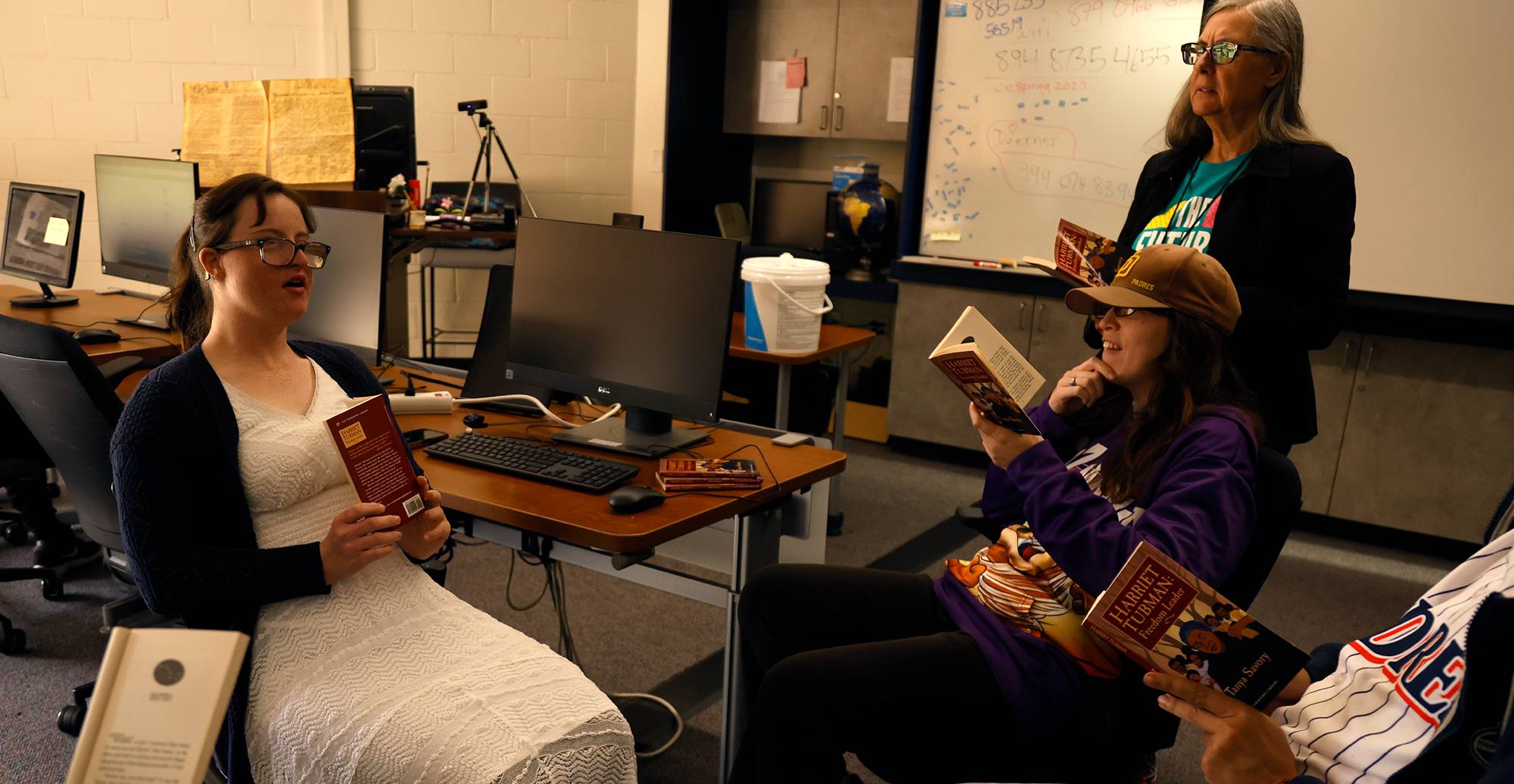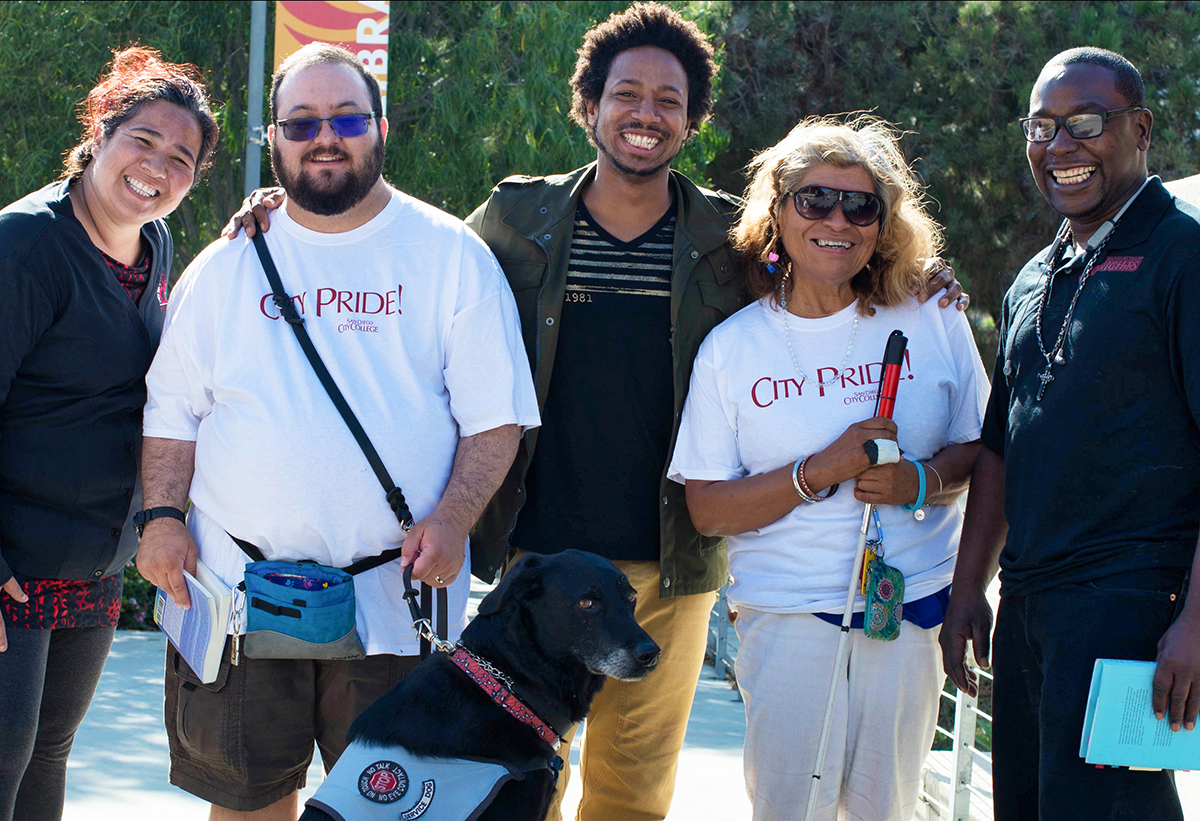
“These services have really made a huge impact in my education,” Jackson said. “These services have made it easier for me to manage myself through reminders from my case worker and the support from my instructors and my peers.”
All four San Diego Community College District colleges — San Diego City, Mesa, Miramar, and Continuing Education — have their own DSPS offices where students can work with a counselor to determine what kind of services or accommodations are needed to help them reach their educational goals. Students are able to meet with counselors at least once a semester, and additional services offered to students include assistive technology, disability management, extended time on exams, priority registration, note-taking and test-taking strategies, textbooks in alternate formats, American Sign Language (ASL) interpreting services, speech to text captioning, and more.
The District is also a part of the San Diego and Imperial Counties Community Colleges Association, a regional consortium of colleges focused on sharing training resources and making assistive technology available to students more consistently from college to college.
Districtwide DSPS offerings are driven with one concept in mind: Disability is seen “as a vital dimension of diversity, and that it is a natural part of the human condition.” It is this inclusive orientation that draws students from throughout the region to the SDCCD.
“A student-centered approach and nurturing a sense of belonging are two important ways that the SDCCD DSPS shows its commitment to students,” said Poppy Fitch, dean of Wellness and Disability Support Programs and Services at SDCCD. “Students can expect that we will prioritize their goals and work closely with them to develop individualized accommodation plans that meet their specific needs and help them achieve academic success.”
An Ever-Evolving Program
The District DSPS provides services at events so students, staff, and visitors who
are deaf or hard-of-hearing can equally enjoy them.
Although SDCCD offers a variety of services, it continues to evolve as new technology
is released or as challenges, such as the COVID-19 pandemic, are presented. Fitch
said “the very heart of the DSPS mission is flexibility.”
“Our work is about finding ways to ensure access and to support student equity by working with students individually to determine their unique strengths and their disability-related impacts in the learning environment,” said Fitch, who has served as the dean for more than three years.
This was demonstrated when the pandemic unfolded, the colleges implemented changes to serve the students. Erika Higginbotham, DSPS coordinator at Mesa College and former assistive technology specialist, used her expertise to develop the faculty resource tool Accessibility of Distance Learning Courses for Students with Disabilities. Miramar College DSPS Coordinator Kandice Brandt, who is also an American Sign Language Interpreter, championed the procurement of Otter.ai, a technology that enables speech-to-text in online and face-to-face environments.
“The evolution of technology has significantly benefited students needing accessibility services by providing them with greater opportunities to access educational resources, communicate with peers and teachers, and participate in academic activities,” Fitch said. “Some of the ways technology has benefited students with disabilities include assistive technology, online learning platforms, communication tools, and mobile devices.”
Led by Acting Dean of DSPS Katie Serbian, College of Continuing Education provides specialized course offerings to students with disabilities. For example, the Acquired Brain Injury program, which continued to provide a crucial service to students and the community throughout the pandemic.
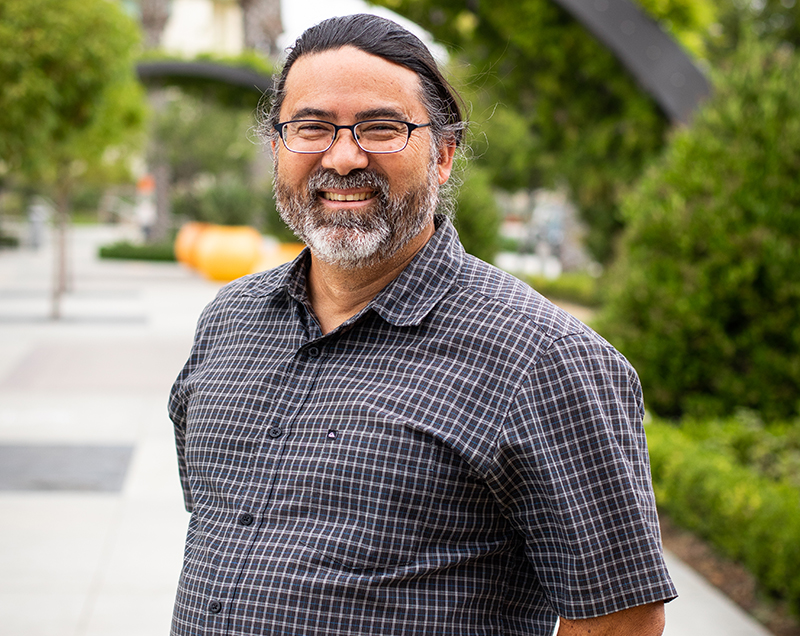
Embracing technology and implementing effective change districtwide allowed students to learn even as they stayed home during the pandemic.
When it comes to ASL interpreting services, Daniel Nakaji, who has worked as the Interpreting Services Supervisor at the SDCCD since 2009, said remarkable progress in technology has been made over the last few years.
“With AI or machine-learning, the accuracy of speech recognition has made tremendous
strides, such that some of our students are fine with using automated speech recognition
as either their sole service for access or to supplement with their existing services,”
Nakaji said.
Nakaji, who is himself deaf, said video conferencing platforms also now offer enhanced
features that support those with disabilities, including better captioning support,
live transcription, and other related features.
Despite the advances in technology, there are still challenges for students with disabilities. For example, limited accessibility of technology, the costs associated with assistive technology, technical challenges, and the digital divide all present obstacles, Fitch said.
“Not all technology is designed to be accessible to people with disabilities,” Fitch
said. “This can limit their access to digital content and communication tools.”
Still, DSPS leaders are continually working to provide exceptional services to their
students with disabilities.
“The DSPS leadership across the District collaborates closely with one another and with college faculty and classified professionals to ensure that accommodations are made and implemented in a timely and effective manner,” said Fitch, who has been serving students with disabilities since 1990. “We collaborate with other student services departments to provide a seamless experience for students with disabilities.”
With that collaboration available, Nakaji said improved services are in the works. He said the District is working closely with the Mesa College ASL-English Interpretation Training Program so that the fieldwork students and graduates can start their professional career in the sign language interpreting field. He hopes these new students can address the shortage of interpreters.
“We are also working with our IT department to improve the WiFi access points at all
campuses to support our technological solutions and accessibility services for our
students,” Nakaji said. “We also provide an online learning opportunity for folks
who may be interested in becoming a captioner.
“We strive to provide [students] with quality services and empower them to meet their
education and career goals.”
The Future of DSPS and Advocacy
Vinzent Balaoing, a student at College of Continuing Education, said the support he has received through the DSPS program has done more than just help him earn an education. He said it has made him an advocate for those with disabilities.
Balaoing, who is partially blind, said he began taking classes at the college more than 10 years ago. Because of the services he received from the school, he is planning a future in film production and plans to transfer to City College to earn his degree.
“DSPS shows the community that the school really cares about their students who have disabilities,” he said. “It has opened up the world for students with disabilities through this program.”
Along with his studies, Balaoing also became involved in the District community and now serves as a student representative for San Diego College of Continuing Education Foundation’s Board of Directors.
“Through advocacy and accommodations, students with disabilities can learn in many ways,” Balaoing said. “It has encouraged me to now fight for students with disabilities and educate others on their rights. I am proud to now be an advocate.”
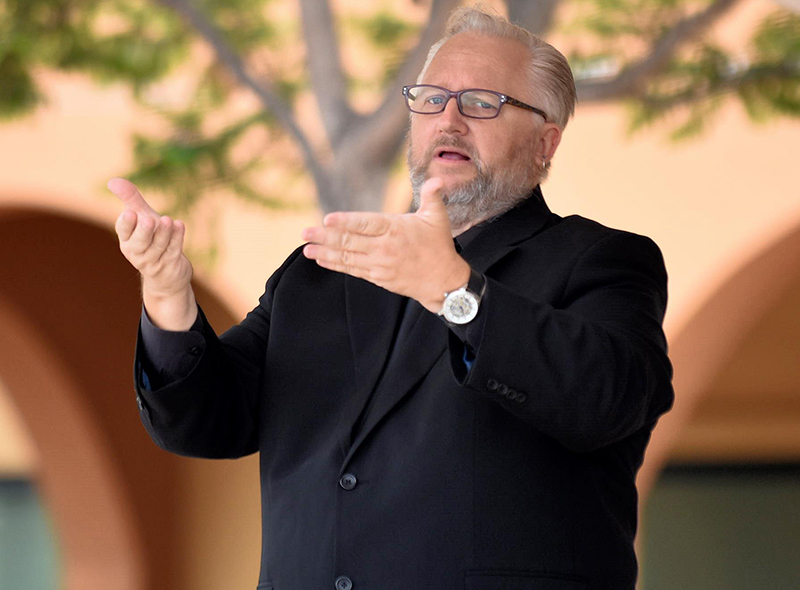
Increasing collaboration toward greater accessibility is one of the many ways that DSPS advocates for access and equity for students with disabilities. In a partnership between Instruction, Online Learning Pathways, and DSPS, online accessibility mentors are situated at each college to support faculty in learning about and implementing accessibility within their online classrooms.
Johanna Gleason, an online accessibility mentor at College of Continuing Education since 2022, said informing students of their rights is a top priority at the District. “Prospective students should know that courses need to be accessible,” Gleason said. “I think most faculty are making a good faith effort to do this, but if a student finds that something isn’t accessible, they shouldn’t be shy about asking their professors about it.”
Gleason, who is also a longtime disability rights advocate, said the District has proven to have excellent services for students with disabilities. “The District does a great job communicating to faculty about what their responsibilities are,” Gleason said. “Students who need accommodations can get them.”
Tucker Grimshaw, an online accessibility mentor for City College, echoed the importance of the program and also expressed his gratitude to the District. “I am grateful for my time as an online accessibility mentor,” Grimshaw said. “I have learned a lot about accessibility, and I am excited to continue doing so. I like to say that accessibility is a moving target, which shows how important being a lifelong learner is. When we take time to create a curriculum with Universal Design for Learning practices, we can create a curriculum for all students.”
A curriculum available for all students is something important to remember. Fitch said all students and prospective students should know that DSPS is a resource.
“For folks thinking, ‘I want to go to college, but I struggle with X,’ that’s a conversation to have with a DSPS counselor,” Fitch said. “It’s our job to understand barriers and work to remove or circumvent them with our students.”
Due to the District’s work to properly accommodate students with disabilities, students like Natalie Jackson and Vinzent Balaoing see bright futures ahead of them. But, they are just two of the roughly 1,800 to 1,900 students with disabilities that the District serves per semester.
Fitch said one student in particular stands out to her when she thinks about the impact of DSPS. “I’m thinking about an older student who has experienced a number of health-related delays on their journey to their goal of graduation,” she said. “For them, the process has been daunting, but DSPS counselors have been tenacious in helping the student make slow and steady progress and will be there to cheer them on this spring when they graduate from San Diego Miramar College!”
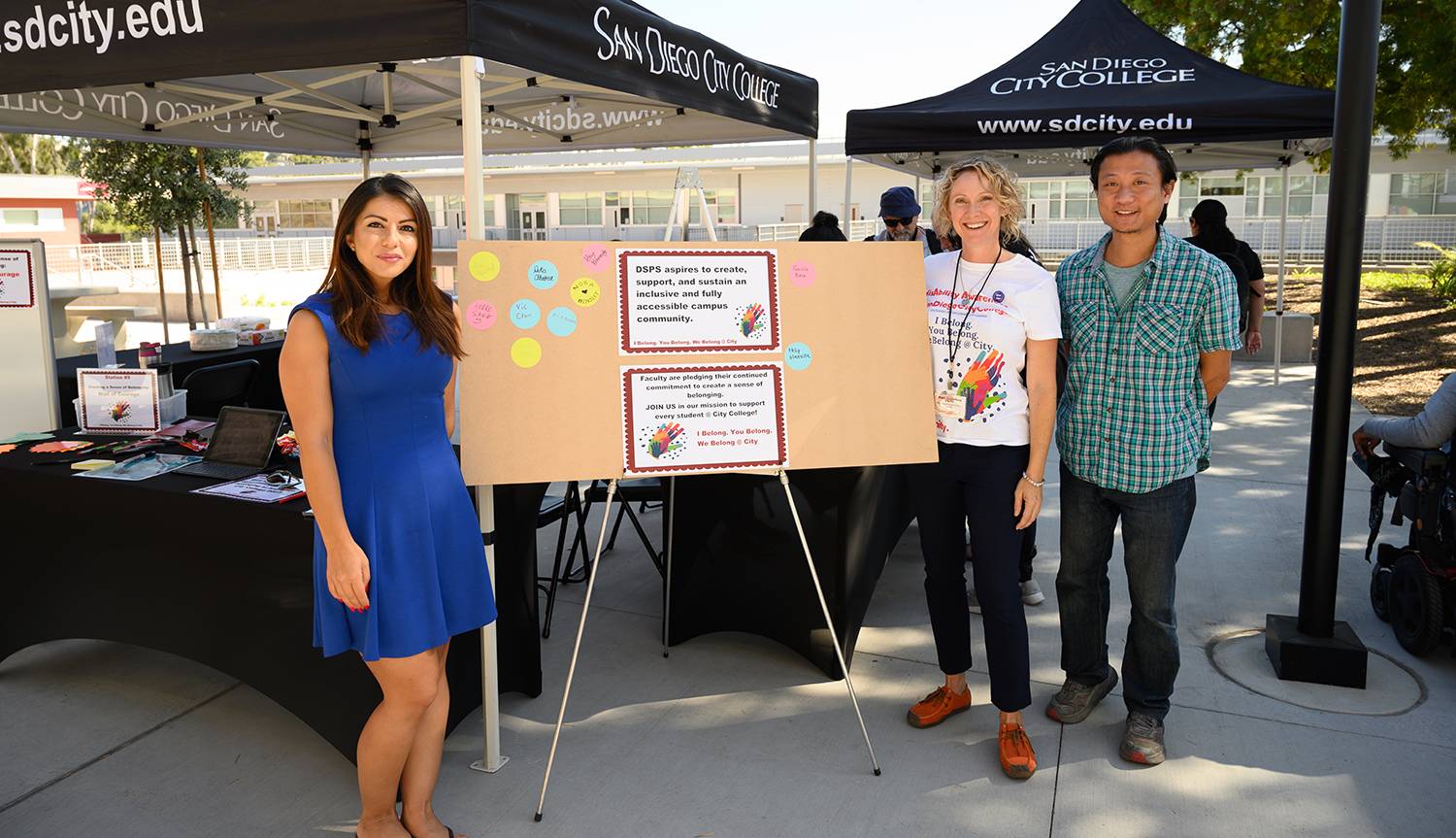
As a way to engage students, faculty and staff at City College host a disAbility Awareness booth.
